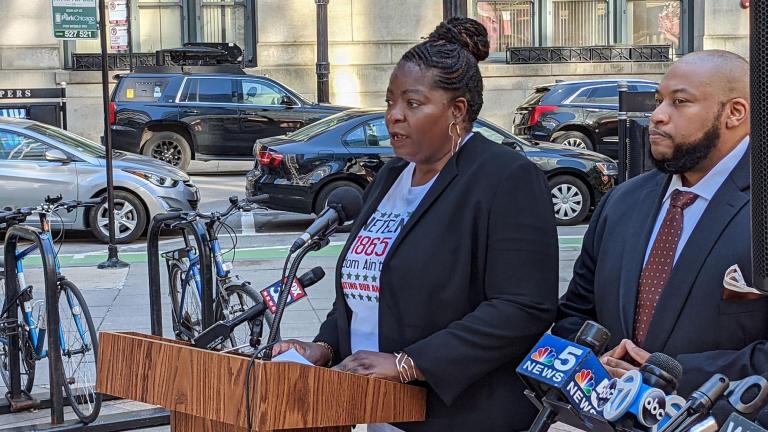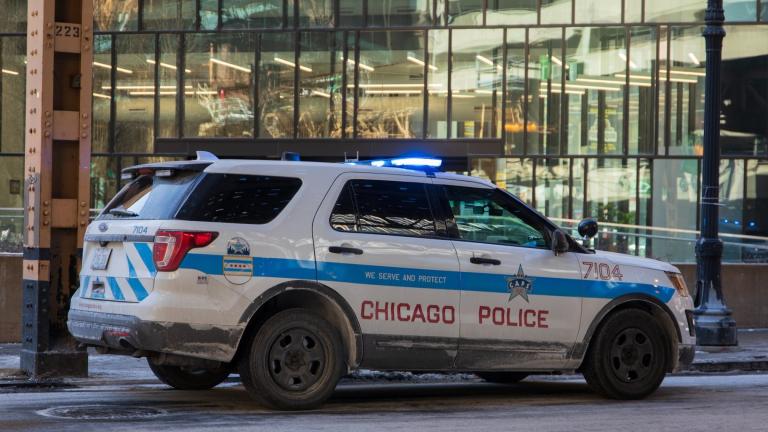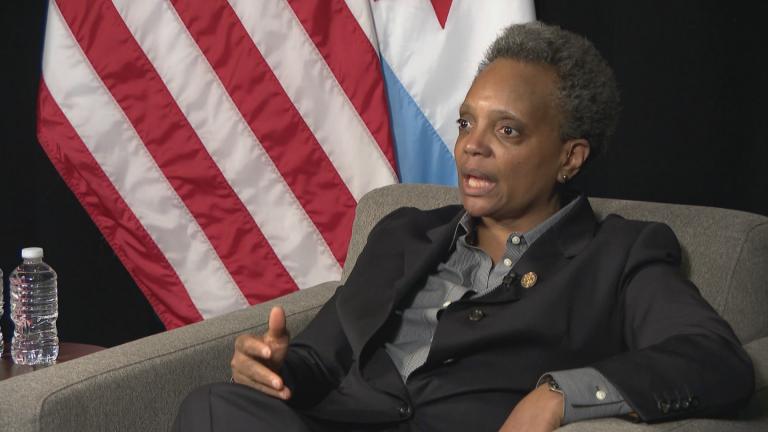Chicago Public Schools officials immediately told Mayor Lori Lightfoot’s deputy campaign manager that her emails to teachers asking them to encourage their students to volunteer to help Lightfoot win a second term as mayor – and earn class credit — were inappropriate, according to records obtained by WTTW News on Thursday.
Seven hours after being informed that the emails violated the district's ethics policy, and after defending the emails to WTTW News, the Lightfoot campaign said it would take steps to ensure that the “solid wall that must exist between campaign and official activities” was not breached.
That lengthy delay contradicts statements made by Lightfoot that she immediately stopped the emails when she was informed about them after a request for comment from WTTW News, which was first to report the story that touched off a political firestorm and triggered a probe by the Chicago Public Schools inspector general.
At 1 p.m. Jan. 11, Chuck Swirsky, senior advisor to CPS CEO Pedro Martinez, sent an email to the district’s chief ethics advisor Jennifer Chan and others that “This has been resolved. They will stop.”
Swirsky memorialized that conversation in another email sent Megan Crane, whose LinkedIn page identifies her as the deputy campaign manager for Lightfoot.
“Thanks for chatting before,” Swirsky wrote to . “Just to reiterate our phone conversation, no recruitment for interns or [volunteers] can be done on campus or by staff/teachers. We also cannot provide any credit.”
Swirsky’s email to his colleagues was sent 90 minutes before WTTW News first asked the Lightfoot campaign about the emails, which told teachers “we’re simply looking for enthusiastic, curious and hard-working young people eager to help Mayor Lightfoot win this spring.”
The Lightfoot campaign declined to answer detailed questions from WTTW News about whether or when Lightfoot was told of the order from CPS officials to stop sending the emails. The campaign also declined to answer questions about why Lightfoot told the news media that she took quick action to stop the emails after WTTW’s story was published, even though her campaign failed to act for seven hours.
“As the mayor has said, once she found out about the email recruitment on January 11th, she directed her staff to cease the efforts,” according to a statement from a spokesperson for the Lightfoot campaign.
At least 168 teachers received the email from Crane, starting at 8:33 a.m. on Jan. 11 and continuing for several hours, according to records obtained through a Freedom of Information Act request. The message was sent to teachers’ official work email accounts, which end in cps.edu.
A spokesperson for the Lightfoot campaign first defended the emails in a statement sent to WTTW News at 5:11 p.m. The emails were part of a “common practice to provide young people with the opportunity to engage with our campaign, learn more about the importance of civic engagement and participate in the most American of processes” and “done using publicly available contact information,” according to the first of three statements put out by the campaign.
After WTTW News published details about the emails, generating a tsunami of criticism from other candidates in the race, Lightfoot's campaign put out a second statement that said the campaign would “cease contact with CPS employees” out of an “abundance of caution.”
At 7:08 p.m., Lightfoot’s campaign issued a third version of the statement:
"All [Lightfoot for Chicago] campaign staff have been reminded about the solid wall that must exist between campaign and official activities and that contacts with any city of Chicago, or other sister agency employees, including CPS employees, even through publicly available sources is off limits. Period.”
The Lightfoot campaign "issued an updated press statement in order to clarify that we had taken her directive and halted the effort," according to the statement released by the campaign.
As mayor of Chicago, Lightfoot appoints not only the superintendent of the Chicago Public Schools but also the members of the Chicago Board of Education. Chicago’s ethics ordinance prohibits the use of public resources, including email accounts, for non-official purposes.
The next day, Lightfoot told reporters at a hastily scheduled news conference that it had been a mistake for her campaign to send those emails and blamed “a young staffer” for making a “mistake” that was “well intentioned.” Lightfoot declined to fire Crane.
Lightfoot said she put an immediate stop to the emails after WTTW News contacted her campaign, even though her spokesperson defended the emails for several hours and after being informed by Martinez’s office that the emails were inappropriate.
Identical emails were sent to City Colleges of Chicago faculty first in August, prompting a complaint to the district’s ethics officer. District officials said they told the Lightfoot campaign that the emails violated their ethics policy and purged the emails from the district’s email system.
Lightfoot declined to answer questions about why her campaign sent another round of emails to City Colleges faculty seeking volunteers in return for credit on Jan. 11 after being admonished in August.
The Chicago Board of Ethics voted unanimously Monday to ask both the Chicago inspector general and the Chicago Public Schools inspector general to probe whether Mayor Lori Lightfoot’s campaign violated the city’s government ethics ordinance.
The Chicago Board of Ethics voted unanimously Monday to ask both the Chicago inspector general and the Chicago Public Schools inspector general to probe whether Lightfoot’s campaign violated the city’s government ethics ordinance.
Ethics Board Chair William Conlon warned all candidates for city office to “immediately and thoroughly scrub their email lists and remove any governmental email addresses,” Conlon said.
“The board also advises candidates, and those associated with those candidates, that emails and other forms of solicitation may be considered coercive if directed to city employees and, or those employed by sister city agencies,” Conlon said.
Contact Heather Cherone: @HeatherCherone | (773) 569-1863 | [email protected]
Contact Heather Cherone: @HeatherCherone | (773) 569-1863 | [email protected]








